- Home
- Carlos Ruiz Zafón
The Shadow of the Wind
The Shadow of the Wind Read online
Contents
The Cemetery of Forgotten Books
Days of Ashes
Chapter 1
Chapter 2
Chapter 3
Chapter 4
Chapter 5
Chapter 6
An Empty Plate
Chapter 7
Chapter 8
Chapter 9
Chapter 10
True to Character
Chapter 11
Chapter 12
Chapter 13
City of Shadows
Chapter 14
Chapter 15
Chapter 16
Chapter 17
Chapter 18
Chapter 19
Chapter 20
Chapter 21
Chapter 22
Chapter 23
Chapter 24
Chapter 25
Chapter 26
Chapter 27
Chapter 28
Chapter 29
Chapter 30
Chapter 31
Chapter 32
Chapter 33
Chapter 34
Chapter 35
Chapter 36
Chapter 37
Chapter 38
Chapter 39
Chapter 40
Chapter 41
Chapter 42
Chapter 43
Chapter 44
Nuria Monfort: Remembrance of the Lost
Chapter 1
Chapter 2
Chapter 3
Chapter 4
Chapter 5
Chapter 6
Chapter 7
Chapter 8
Chapter 9
Chapter 10
Chapter 11
Chapter 12
Chapter 13
The Shadow of the Wind
Chapter 1
Chapter 2
Chapter 3
Chapter 4
Postmortem
The Waters of March
Dramatis Personae
The Shadow of the Wind
The Shadow of the Wind
CARLOS RUIZ ZAFÓN
Translated by Lucia Graves
THE PENQUIN PRESS
NEW YORK
2004
THE PENGUIN PRESS
a member of
Penguin Group (USA) Inc.
375 Hudson Street
New York, New York 10014
Copyright © Carlos Ruiz Zafón, 2001
Translation copyright © Lucia Graves, 2004
All rights reserved
Orginally published in Spanish asLa Sombra del Viento by Editorial Planeta, S.A., Barcelona.
This publication has been translated with aid from the General Department for Books, Archives and Libraries of the Spanish Ministry of Education, Culture and Sports.
PUBLISHER’S NOTE
This is a work of fiction. Names, characters, places, and incidents either are the product of the author’s imagination or are used fictitiously, and any resemblance to actual persons, living or dead, business establishments, events, or locales is entirely coincidental.
LIBRARY OF CONGRESS CATALOGING IN PUBLICATION DATA
Ruiz Zafón, Carlos, 1964–
[La Sombra del viento. English]
The shadow of the wind / Carlos Ruiz Zafón; translated by Lucia Graves. p. cm
ISBN: 1-101-14706-7
I. Graves, Lucia. II. Title.
PQ6668. U49S6613 2004
863.64—dc22 2003062376
Without limiting the rights under copyright reserved above, no part of this publication may be reproduced, stored in or introduced into a retrieval system, or transmitted, in any form or by any means (electronic, mechanical, photocopying, recording, or otherwise), without the prior written permission of both the copyright owner and the above publisher of this book.
The scanning, uploading, and distribution of this book via the Internet or via any other means without permission of the publisher is illegal and punishable by law. Please purchase only authorized electronic editions and do not participate in or encourage electronic piracy of copyrighted materials. Your support of the author’s rights is appreciated.
For Joan Ramon Planas, who deserves better
The Cemetery of Forgotten Books
I STILL REMEMBER THE DAY MY FATHER TOOK ME TO THE CEMETERY OF Forgotten Books for the first time. It was the early summer of 1945, and we walked through the streets of a Barcelona trapped beneath ashen skies as dawn poured over Rambla de Santa Mónica in a wreath of liquid copper.
“Daniel, you mustn’t tell anyone what you’re about to see today,” my father warned. “Not even your friend Tomás. No one.”
“Not even Mommy?”
My father sighed, hiding behind the sad smile that followed him like a shadow through life.
“Of course you can tell her,” he answered, heavyhearted. “We keep no secrets from her. You can tell her everything.”
Shortly after the Civil War, an outbreak of cholera had taken my mother away. We buried her in Montjuïc on my fourth birthday. I can only recall that it rained all day and all night, and that when I asked my father whether heaven was crying, he couldn’t bring himself to reply. Six years later my mother’s absence remained in the air around us, a deafening silence that I had not yet learned to stifle with words. My father and I lived in a modest apartment on Calle Santa Ana, a stone’s throw from the church square. The apartment was directly above the bookshop, a legacy from my grandfather that specialized in rare collectors’ editions and secondhand books—an enchanted bazaar, which my father hoped would one day be mine. I was raised among books, making invisible friends in pages that seemed cast from dust and whose smell I carry on my hands to this day. As a child I learned to fall asleep talking to my mother in the darkness of my bedroom, telling her about the day’s events, my adventures at school, and the things I had been taught. I couldn’t hear her voice or feel her touch, but her radiance and her warmth haunted every corner of our home, and I believed, with the innocence of those who can still count their age on their ten fingers, that if I closed my eyes and spoke to her, she would be able to hear me wherever she was. Sometimes my father would listen to me from the dining room, crying in silence.
On that June morning, I woke up screaming at first light. My heart was pounding in my chest as if it feared that my soul wanted to carve its way out and run off down the stairs. My father hurried into my room and held me in his arms, trying to calm me.
“I can’t remember her face. I can’t remember Mommy’s face,” I muttered, breathless.
My father held me tight.
“Don’t worry, Daniel. I’ll remember for both of us.”
We looked at each other in the half-light, searching for words that didn’t exist. For the first time, I realized my father was growing old. He stood up and drew the curtains to let in the pale glint of dawn.
“Come, Daniel, get dressed. I want to show you something,” he said.
“Now? At five o’clock in the morning?”
“Some things can only be seen in the shadows,” my father said, flashing a mysterious smile probably borrowed from the pages of one of his worn Alexandre Dumas romances.
Night watchmen still lingered in the misty streets when we stepped out of the front door. The lamps along the Ramblas sketched an avenue of vapor that faded as the city began to awake. When we reached Calle Arco del Teatro, we continued through its arch toward the Raval quarter, entering a vault of blue haze. I followed my father through that narrow lane, more of a scar than a street, until the gleam of the Ramblas faded behind us. The brightness of dawn filtered down from balconies and cornices in streaks of slanting light that dissolved before touching the ground. At last my father stopped in front of a l
arge door of carved wood, blackened by time and humidity. Before us loomed what to my eyes seemed the carcass of a palace, a place of echoes and shadows.
“Daniel, you mustn’t tell anyone what you’re about to see today. Not even your friend Tomás. No one.”
A smallish man with vulturine features framed by thick gray hair opened the door. His impenetrable aquiline gaze rested on mine.
“Good morning, Isaac. This is my son, Daniel,” my father announced. “Soon he’ll be eleven, and one day the shop will be his. It’s time he knew this place.”
The man called Isaac nodded and invited us in. A blue-tinted gloom obscured the sinuous contours of a marble staircase and a gallery of frescoes peopled with angels and fabulous creatures. We followed our host through a palatial corridor and arrived at a sprawling round hall, a virtual basilica of shadows spiraling up under a high glass dome, its dimness pierced by shafts of light that stabbed from above. A labyrinth of passageways and crammed bookshelves rose from base to pinnacle like a beehive woven with tunnels, steps, platforms, and bridges that presaged an immense library of seemingly impossible geometry. I looked at my father, stunned. He smiled at me and winked.
“Welcome to the Cemetery of Forgotten Books, Daniel.”
I could make out about a dozen human figures scattered among the library’s corridors and platforms. Some of them turned to greet me from afar, and I recognized the faces of various colleagues of my father’s, fellows of the secondhand-booksellers’ guild. To my ten-year-old eyes, they looked like a brotherhood of alchemists in furtive study. My father knelt next to me and, with his eyes fixed on mine, addressed me in the hushed voice he reserved for promises and secrets.
“This is a place of mystery, Daniel, a sanctuary. Every book, every volume you see here, has a soul. The soul of the person who wrote it and of those who read it and lived and dreamed with it. Every time a book changes hands, every time someone runs his eyes down its pages, its spirit grows and strengthens. This place was already ancient when my father brought me here for the first time, many years ago. Perhaps as old as the city itself. Nobody knows for certain how long it has existed, or who created it. I will tell you what my father told me, though. When a library disappears, or a bookshop closes down, when a book is consigned to oblivion, those of us who know this place, its guardians, make sure that it gets here. In this place, books no longer remembered by anyone, books that are lost in time, live forever, waiting for the day when they will reach a new reader’s hands. In the shop we buy and sell them, but in truth books have no owner. Every book you see here has been somebody’s best friend. Now they have only us, Daniel. Do you think you’ll be able to keep such a secret?”
My gaze was lost in the immensity of the place and its sorcery of light. I nodded, and my father smiled.
“And do you know the best thing about it?” he asked.
I shook my head.
“According to tradition, the first time someone visits this place, he must choose a book, whichever he wants, and adopt it, making sure that it will never disappear, that it will always stay alive. It’s a very important promise. For life,” explained my father. “Today it’s your turn.”
For almost half an hour, I wandered within the winding labyrinth, breathing in the smell of old paper and dust. I let my hand brush across the avenues of exposed spines, musing over what my choice would be. Among the titles faded by age, I distinguished words in familiar languages and others I couldn’t identify. I roamed through galleries filled with hundreds, thousands of volumes. After a while it occurred to me that between the covers of each of those books lay a boundless universe waiting to be discovered, while beyond those walls, in the outside world, people allowed life to pass by in afternoons of football and radio soaps, content to do little more than gaze at their navels. It might have been that notion, or just chance, or its more flamboyant relative, destiny, but at that precise moment I knew I had already chosen the book I was going to adopt, or that was going to adopt me. It stood out timidly on one corner of a shelf, bound in wine-colored leather. The gold letters of its title gleamed in the light bleeding from the dome above. I drew near and caressed them with the tips of my fingers, reading to myself.
THE SHADOW OF THE WIND
JULIÁN CARAX
I had never heard of the title or the author, but I didn’t care. The decision had been taken. I pulled the volume down with great care and leafed through the pages, letting them flutter. Once liberated from its prison on the shelf, the book shed a cloud of golden dust. Pleased with my choice, I tucked it under my arm and retraced my steps through the labyrinth with a smile on my lips. Perhaps the bewitching atmosphere of the place had got the better of me, but I felt sure thatThe Shadow of the Wind had been waiting for me there for years, probably since before I was born.
THAT AFTERNOON, BACK IN THE APARTMENT ON CALLE SANTA ANA, I barricaded myself in my room to read the first few lines. Before I knew what was happening, I had fallen right into it. The novel told the story of a man in search of his real father, whom he never knew and whose existence was only revealed to him by his mother on her deathbed. The story of that quest became a ghostly odyssey in which the protagonist struggled to recover his lost youth, and in which the shadow of a cursed love slowly surfaced to haunt him until his last breath. As it unfolded, the structure of the story began to remind me of one of those Russian dolls that contain innumerable ever-smaller dolls within. Step by step the narrative split into a thousand stories, as if it had entered a gallery of mirrors, its identity fragmented into endless reflections. The minutes and hours glided by as in a dream. When the cathedral bells tolled midnight, I barely heard them. Under the warm light cast by the reading lamp, I was plunged into a new world of images and sensations, peopled by characters who seemed as real to me as my room. Page after page I let the spell of the story and its world take me over, until the breath of dawn touched my window and my tired eyes slid over the last page. I lay in the bluish half-light with the book on my chest and listened to the murmur of the sleeping city. My eyes began to close, but I resisted. I did not want to lose the story’s spell or bid farewell to its characters yet.
ONCE, IN MY FATHER’S BOOKSHOP, I HEARD A REGULAR CUSTOMER SAY that few things leave a deeper mark on a reader than the first book that finds its way into his heart. Those first images, the echo of words we think we have left behind, accompany us throughout our lives and sculpt a palace in our memory to which, sooner or later—no matter how many books we read, how many worlds we discover, or how much we learn or forget—we will return. For me those enchanted pages will always be the ones I found among the passageways of the Cemetery of Forgotten Books.
Days of Ashes
1945–1949
· 1 ·
A SECRET’S WORTH DEPENDS ON THE PEOPLE FROM WHOM IT MUST be kept. My first thought on waking was to tell my best friend about the Cemetery of Forgotten Books. Tomás Aguilar was a classmate who devoted his free time and his talent to the invention of wonderfully ingenious contraptions of dubious practicality, like the aerostatic dart or the dynamo spinning top. I pictured us both, equipped with flashlights and compasses, uncovering the mysteries of those bibliographic catacombs. Who better than Tomás to share my secret? Then, remembering my promise, I decided that circumstances advised me to adopt what in detective novels is termed a different modus operandi. At noon I approached my father to quiz him about the book and about Julián Carax—both world famous, I assumed. My plan was to get my hands on his complete works and read them all by the end of the week. To my surprise, I discovered that my father, a natural-born librarian and a walking lexicon of publishers’ catalogs and oddities, had never heard ofThe Shadow of the Wind or Julián Carax. Intrigued, he examined the printing history on the back of the title page for clues.
“It says here that this copy is part of an edition of twenty-five hundred printed in Barcelona by Cabestany Editores, in June 1936.”
“Do you know the publishing house?”
“It
closed down years ago. But, wait, this is not the original. The first edition came out in November 1935 but was printed in Paris…. Published by Galiano & Neuval. Doesn’t ring a bell.”
“So is this a translation?”
“It doesn’t say so. From what I can see, the text must be the original one.”
“A book in Spanish, first published in France?”
“It’s not that unusual, not in times like these,” my father put in. “Perhaps Barceló can help us….”
Gustavo Barceló was an old colleague of my father’s who now owned a cavernous establishment on Calle Fernando with a commanding position in the city’s secondhand-book trade. Perpetually affixed to his mouth was an unlit pipe that impregnated his person with the aroma of a Persian market. He liked to describe himself as the last romantic, and he was not above claiming that a remote line in his ancestry led directly to Lord Byron himself. As if to prove this connection, Barceló fashioned his wardrobe in the style of a nineteenth-century dandy. His casual attire consisted of a cravat, white patent leather shoes, and a plain glass monocle that, according to malicious gossip, he did not remove even in the intimacy of the lavatory. Flights of fancy aside, the most significant relative in his lineage was his begetter, an industrialist who had become fabulously wealthy by questionable means at the end of the nineteenth century. According to my father, Gustavo Barceló was, technically speaking, loaded, and his palatial bookshop was more of a passion than a business. He loved books unreservedly, and—although he denied this categorically—if someone stepped into his bookshop and fell in love with a tome he could not afford, Barceló would lower its price, or even give it away, if he felt that the buyer was a serious reader and not an accidental browser. Barceló also boasted an elephantine memory allied to a pedantry that matched his demeanor and the sonority of his voice. If anyone knew about odd books, it was he. That afternoon, after closing the shop, my father suggested that we stroll along to the Els Quatre Gats, a café on Calle Montsió, where Barceló and his bibliophile knights of the round table gathered to discuss the finer points of decadent poets, dead languages, and neglected, moth-ridden masterpieces.

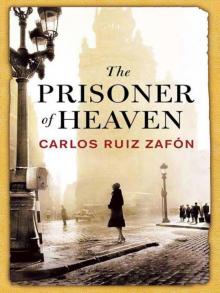 The Prisoner of Heaven
The Prisoner of Heaven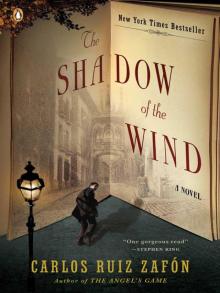 The Shadow of the Wind
The Shadow of the Wind Marina
Marina The Angel's Game
The Angel's Game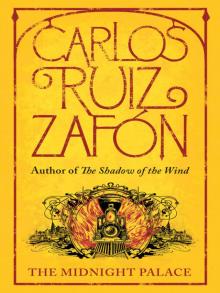 The Midnight Palace
The Midnight Palace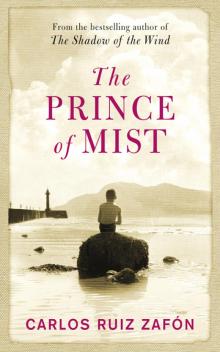 The Prince of Mist
The Prince of Mist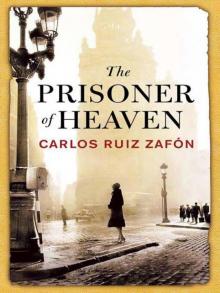 The Prisoner of Heaven: A Novel
The Prisoner of Heaven: A Novel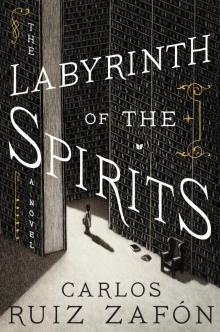 The Labyrinth of the Spirits
The Labyrinth of the Spirits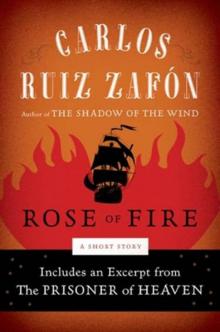 Rose of Fire
Rose of Fire